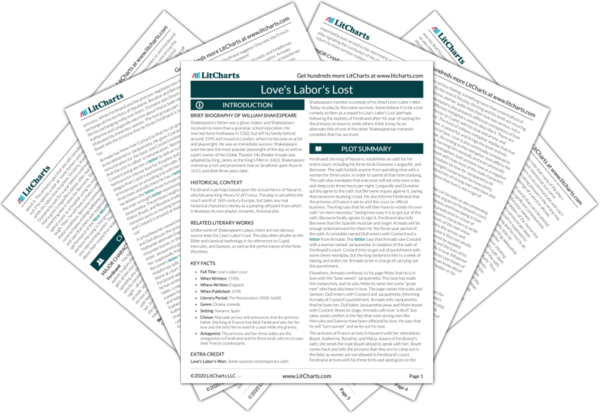The Nine Worthies Quotes in Love's Labor's Lost
I will hereupon confess I am in love; and as it is base for a soldier to love, so am I in love with a base wench. . . . I think scorn to sigh; methinks I should outswear Cupid. Comfort me, boy. What great men have been in love?
Now step I forth to whip hypocrisy.
Ah, good my liege, I pray thee pardon me.
Good heart, what grace hast thou thus to reprove
These worms for loving, that art most in love?
. . .
O, what a scene of fool’ry have I seen,
Of sighs, of groans, of sorrow, and of teen!
O me, with what strict patience have I sat,
To see a king transformed to a gnat!
To see great Hercules whipping a gig,
And profound Solomon to tune a jig,
And Nestor play at pushpin with the boys,
And critic Timon laugh at idle toys.
The very all of all is—but sweetheart, I do implore secrecy—that the King would have me present the Princess, sweet chuck, with some delightful ostentation, or show, or pageant, or antic, or firework.
. . .
Sir, you shall present before her the Nine Worthies.
. . .
Where will you find men worthy enough to present them?
Judas I am—
A Judas!
Not Iscariot, sir.
Judas I am, yclept Maccabaeus.
Judas Maccabaeus clipped is plain Judas.
A kissing traitor.—How art thou proved Judas?
Judas I am—
The more shame for you, Judas.
God save you, madam.
Welcome, Marcade,
But that thou interruptest our merriment.
I am sorry, madam, for the news I bring
Is heavy in my tongue. The King your father—
Dead, for my life.
Even so. My tale is told.
Worthies away! The scene begins to cloud.

















